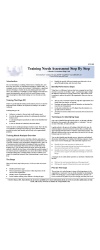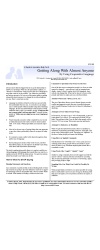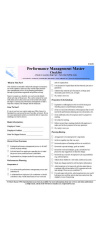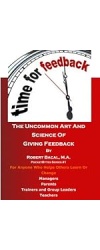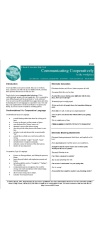The Power of Language
We’re all familiar with verbal abuse that is “in your face”, and that involves yelling, swearing, direct insults and similar tactics. It’s ugly, but the one saving grace is that if it’s aimed at you, you KNOW it’s nasty. You understand what the other person is doing.
On the other hand, there’s a whole family of verbal abuse tactics that are more subtle and can pass unnoticed if you are on the receiving end, but take a toll nonetheless. It’s the subtle put-downs, and “meta-messages” that we “hear” but may not be aware of that constitute ongoing attacks that are difficult to recognize, or act upon. This quiet abuse works because of our brains’ abilities to look beyond the words to peek at the underlying meanings of what’s said.
Below are some of the abuse tactics that we explain. These have in common applying pressure on the other person so he or she will give in. We consider them verbally abusive when carried past a reasonable point, because they are coercive with the speaker trying to get his way and with little regard for the other person’s wishes.
Sympathy/Pity Based:
An appeal to the other person’s compassion to get the person to give in. Common in children, but also used by adults, an example would be: “All my friends get to stay out late and they make fun of me, so can I…“ If you have kids you know this one.
Always/Never Language:
Used by people to make their position or argument sound better, usually ends up in unpleasant arguments. For example: “You never take out the garbage” or “Why are you always late getting your projects done?” . These create arguments because there are very few things that are always or never true. Also suggests the recipient is “less than” he or she ought to be.
Appeals To Authority:
Invoking the ideas or words of someone who sounds important or sounds like they know about the issue being discussed. In other words calling on an expert. For example: “Dr. Phil says that you are making the worst mistake a person in a marriage could make”. The reason this type of thing is manipulative is that Dr. Phil isn’t there to ask, and certainly isn’t in a position to know the exact context of your discussion. It’s a pressure tactic.
The Unnamed They Tactic:
A favorite of people trying to convince you of the evil intent of one group or another, or just generally to support an argument. For example: “Well, we’d love to refund your money but they won’t let us”. Or, “I don’t like giving out the information because they might use it without my knowing”. Also used to completely avoid taking responsibility for anything. Here’s another example: “Well you know everyone thinks you come across as arrogant”
Use of Status/Knowledge:
This involves moving from a discussion of the facts and issues, to questioning the other person’s status or qualification or knowledge. For example: “What could you possibly know about cars”, or, “I’ve studied this and have a college degree in this, so I know.” Notice the two different ways this is used. The first example is a demeaning attack, while the second is an attempt to present oneself as an expert to intimidate.
The Everyone Tactic:
“Everyone does it“, is a refrain that is used to excuse oneself for doing something stupid, because other people are doing that same stupid thing. Not only used as manipulative, but it’s also a means of self-deception. For example: “Everyone drives over the speed limit so what‘s the big deal?”, “Well, I‘m not the only one eating a lot of junk food, you know”, or “Everyone cheats on their taxes.” Another example: “Everyone does it so why don’t you? What’s wrong with you?”
The Common Sense Pressure Tactic:
What does it mean when someone says “Well, it’s common sense, you know”? Usually it means they don’t know how to support their position, so they fall back to this completely empty statement. What’s common sense (or obvious) is subjective. The message underlying this technique is that if you disagree with the speaker’s position, you are obviously lacking in common sense, which is a form of personal attack.

